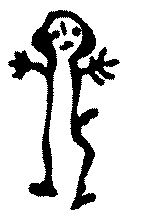| the Dao of Atheism : |  |
: the Shaman Atheist 25/81 |
25
|
Even before the earth and the sky existed, there was already something
something not material, something silent.
The Dao is great, so is the sky, the earth,
Humanity follows the nature of the earth, |
Belief is secondary to experience. In the mental process of determining truth, of answering the internal question, how do i know this is true or false?, the primary evidence for truth is personal experience. Not reason, not social indoctrination. Personal experience. That i will live tomorrow is reasonable. That i should apply for a license from the state to get married in order to have a long-term and sexual relationship with a person and raise "legitimate" children is social indoctrination. Mathematics is a curious blend of social indoctrination and reason: there is no experience that can validate its existence, yet once we assume certain "givens," everything in the mathematical universe becomes reasonable. The existence and qualities of god/dess can be reasoned only after the assumption of its existence is made. Just the same, the non-existence of god/dess can only be reasoned after it is assumed to not exist. Even the assumption of ignorance regarding the non-/existence of god/dess can be made only after assuming that material sensorial reality or reason itself are the primary modes of knowledge. Not so. You know more than you think. If you think about something, then you can believe in it. If you experience something, you have little choice but to believe in it. If you do not experience something, then you have to decide whose word is good enough for you to cast in your belief, if anybody's, or, if you do not experience something, you can leave it at that until such time that you do experience it. Like sex and its quality. Imagine when you didn't know about it experientially: what kind of knowledge did you have about it? how trustworthy was it? How did the quality of your sexual knowledge change when you experienced it? Imagine somebody without sex organs, somebody that couldn't experience sex ... what would their knowledge of sex be like? |
first :: middle :: last
cover :: endnotes
©1992 tpkunesh@atheisms.info